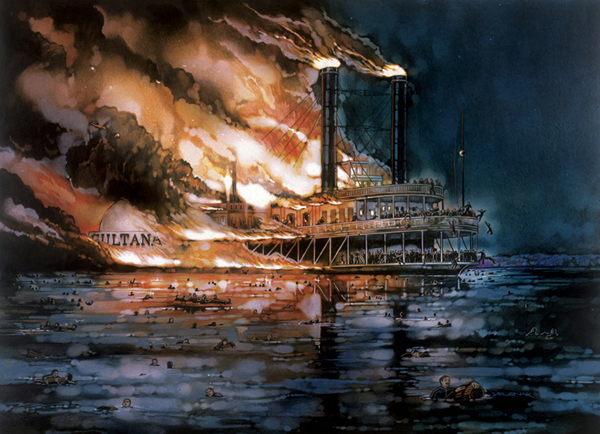From the Archives: Twice Saved |
| Printer-friendly version | Email this article |
|
He was Captain J. Walter Elliot, Class of 1858. Twenty-eight years old when President Lincoln first called for volunteers, the young lawyer sold his practice and became a captain in the 44th United States Colored Troops. Leading African American soldiers into battle, Elliott was captured September 7, 1864, and sent to Andersonville.
He was released from the prison camp near the end of the War and transported to Vicksburg, Mississippi, where he encountered another Wabash man—Benjamin Marshall Mills, Class of 1868, the son of the College’s first professor, Caleb Mills. Benjamin wrote to his mother of their meeting in a letter dated April 19, 1865: He is the only officer of the Black Troops that I know of among the prisoners. He has seen a hard time but is ready to help with it until the war is over… . Thinks he will go to Crawfordsville after he is exchanged if he can get a leave of absence, and then you will have a chance of hearing of the horrors of prison life.
On April 24, the steamboat Sultana arrived at Vicksburg. The boat was legally licensed to carry 376 persons, including crew. It left Vicksburg with between 2,000 and 2,300 passengers, including Captain Elliott. Early in the morning of April 27, the Sultana exploded and burned, killing more than 1,700 men, women, and children.
A transcription in the Wabash Archives of a letter written by Captain Elliott to his brother describes the chaos after the explosion:
"Captain, will you please help me?"
I turned in the direction of the voice, so polite, so cool, and calm amid this confusion. There on the head of the last cot…covered with pieces of the wreck, sits a man, cut, bruised, and scalded in various places, both ankles broken, bones protruding. With his suspenders he had improvised tourniquet for both legs, to prevent bleeding to death.
"I am powerless to help you, I can’t swim," I replied.
"Throw me in the river is all I ask, else I will burn to death here," said he… .
I saw two Kentuckians meet, each lamenting that he couldn’t swim,
"Then let us die together," said one…so locked in each other’s arm they leaped, sank, and the muddy waters closed over them.
I saw others blinded by the explosion leap into the fire and die.
Captain Elliott lamented not being able to help more of the victims, but, in fact, he did his part and more. Though injured in the explosion and fire, he managed to organize a contingent of prisoner survivors of the Sultana disaster from Indiana and Ohio, traveling with them to Cairo, Illinois, Columbus, Ohio, and finally to Indianapolis. He did not rest until his fellow survivors of Andersonville and the Sultana were safely home.
Back at Wabash, news of the Sultana tragedy had reached Professor Caleb Mills, who wrote to his son, Benjamin:
The horrible steamboat tragedy on the Mississippi containing returned soldiers ought to be investigated. If the boat was unsafe, the quartermaster who put them on board such a craft ought to be shot. I learned that Elliott was saved.
I hope that when you return you will wait and get a good boat and not go on one loaded to the guards with human beings.
—Your Affectionate Father.
To learn more, visit the Robert T. Ramsay, Jr. Archival Center at Wabash: www.wabash.edu/library
Wabash Archivist Beth Swift provided research and information for this article.
|

